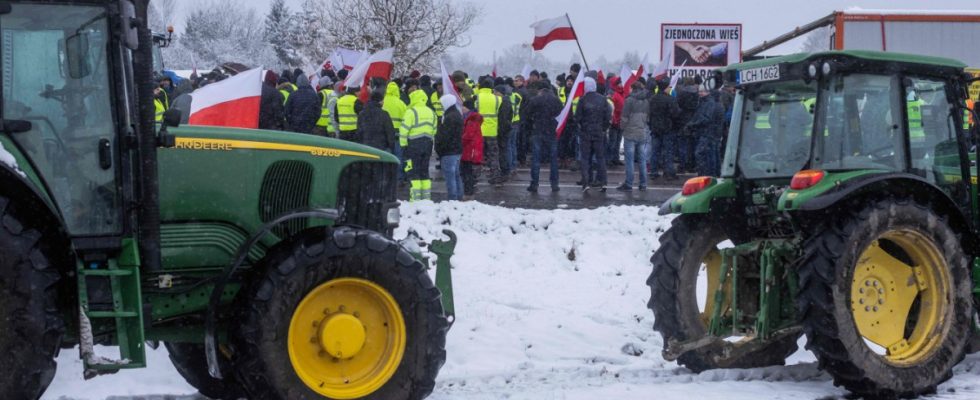Burning car tires, smoke bombs and spilled grain: Polish farmers are no longer just blocking roads or driving their machines into city centers. These days they are once again blocking the border crossings to Ukraine and are protesting all over the country. In Wroclaw on Thursday they threw rotten eggs in front of the European Commission representation and a voivodeship building. The farmers want to go to the capital Warsaw at the end of February. At the beginning of January it still looked as if the new Polish government had been able to calm the situation. At that time, it met three of the farmers’ main demands: compensation payments for corn, longer loan terms, and unchanged tax rates.
But now the protests are stronger than before. A week ago, demonstrators stopped Ukrainian trucks at the Dorohusk border crossing, opened the flaps – and some of the grain spilled onto the street. The Ukrainians eventually drove back. “We are going bankrupt,” complained a farmer representative on television. That’s why they want to stop all imports of agricultural goods from Ukraine. The goods are cheaper than those from EU companies and often do not meet EU standards in terms of cultivation and storage. And they shouldn’t actually come onto the market in the EU.
Wheat, corn, sugar, but also fruit, wine and oil come to the EU overland because Russia has been cutting off Ukraine’s sea routes for two years now. To help the country export, the EU facilitated overland exports. But instead of reaching buyer countries in the Middle East and North Africa via northern European seaports, farmers complain that too much of it ends up on the EU market.
From Latvia in the north to Romania in the south, farmers see it very similarly and want to protest together this Thursday; many want to drive their tractors to the country’s borders to block imports.
The Czech Republic is also there. However, the announcement is worded very mildly: “The action will be more symbolic, we don’t want to block traffic and restrict anyone,” said the President of the Czech Chamber of Agriculture, Jan Doležal, at a press conference. The protest is expressly not directed against the government in Prague, but rather against the EU’s policy of allowing duty-free import of Ukrainian goods, where the same standards do not prevail. Bureaucracy, regulatory mania, and not least the Green Deal are a burden on agriculture and make products more expensive, which are no longer competitive, explained Doležal.
Green Deal is intended to make EU agriculture more crisis-proof
Actually, the Green Deal wants to prevent that. Soils should be protected, fewer pesticides used, while at the same time EU agriculture should be made more crisis-proof and food prices should be kept stable. The EU should be able to operate in a climate-neutral manner by 2050, but there has long been criticism of the Green Deal all over Europe. For some it doesn’t go far enough, but farmers think the burden is too high.
Doležal deliberately does not speak of a pure protest against the Green Deal. But rather a protest “against the EU’s complicated agricultural policy”. The Chamber of Agriculture, the Agricultural Association and the Association of Private Farmers have clearly distanced themselves from an action that could paralyze the capital Prague this Monday with up to 1,000 tractors. Behind this protest are former Corona deniers and well-known conspiracy tellers, whose demonstration will probably be directed against the entire “system” and the conservative-liberal government.
In fact, the five-party coalition, led by the conservative Petr Fiala, is skeptical about the Green Deal, and the Czech Agriculture Minister Marek Vyborný wants to withdraw from the contract. The situation is similar in the other three Visegrád states: Slovakia, Poland and Hungary. Agricultural representatives from all four countries met last week in Otrębusy, Poland. Together they addressed their demands to the EU Commission for import stops and fewer Green Deal regulations. Delegations from Lithuania and Latvia joined. Poland’s Agriculture Minister Czesław Siekierski said: “We want to keep the Green Deal to a minimum.”
Protests strain relations with Ukraine
The protests against Ukrainian goods are straining relations with Ukraine. This is particularly important for the very close allies Poland, the Czech Republic and the Balts. Especially since the reactions from Kiev are becoming increasingly sharper and talks that are being held again and again between Poland and Ukraine, for example, do not seem to have had any effect so far.
The Polish Minister of Agriculture Czesław Siekierski tried to mediate. Dumping Ukrainian grain onto the streets is not an appropriate form of protest, he said. But he could understand the desperation of the farmers. “They have no money for fertilizers and pesticides.” The Polish farmers wanted to continue to support the Ukrainians, but the help should go to the small businesses and not to the “oligarchs who farm huge areas.” These are essentially the ones behind the destabilization of the EU markets. A solution to this can only be found together with the European Commission.

